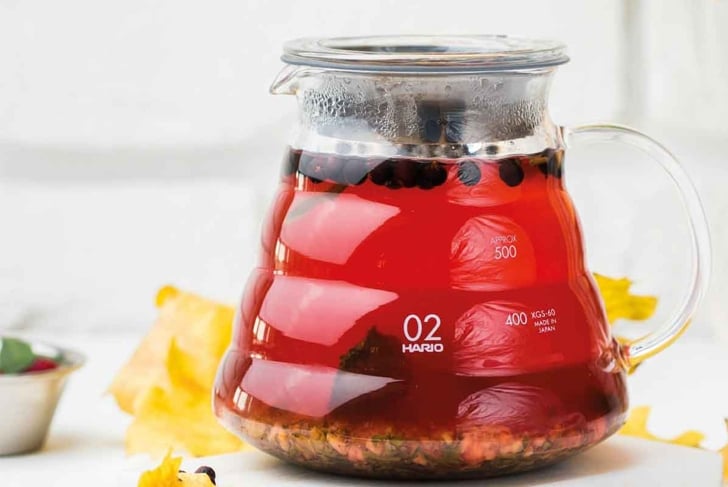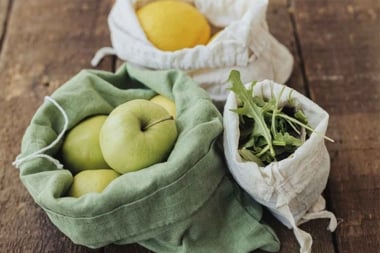
As the days grow shorter and that familiar seasonal chill starts to settle in, we instinctively reach for comforts. Nothing works better at warding off the cold than a cozy cup of herbal tea that warms you from the inside out. But a simple herbal brew offers more than just comfort: it’s an easy and accessible way to help boost your immunity and well-being during cold and flu season.
Hot or cold?
Studies have shown that drinking tea hot may impart weight management and mental health benefits.
What’s in a name?
While it’s great that we can sip our way to better health, what exactly is herbal tea? According to Eliza Lam and Dominique Yan, the mother and son team behind Aroma Tea House in Vancouver, herbal tea is “any steeped drink that does not contain Camellia sinensis.”
All true teas are made from the leaves harvested from one plant species called Camellia sinensis. Depending on the degree of polyphenolic oxidation the leaves undergo, a tea can be placed into one of six categories: green, white, yellow, oolong, black, and dark (Pu-eur).
Herbal teas, also known as herbal infusions, tisane, or botanical infusions, are not technically “tea.” While brewed in a similar fashion, herbal teas are made from any part of a plant, including the flowers, roots, leaves, seeds, bark, and berries. Herbal teas are a great alternative for those looking to go caffeine free. Some herbs, though, such as yerba mate and guayusa, do contain caffeine and are sometimes added to herbal tea blends.
Stuck on where to start?
A daily ritual with one of these immune-supporting teas will not only fortify your body against seasonal challenges but will also support you in staying strong and resilient throughout the fall.
- chamomile + cinnamon stick + cloves
- turmeric + black pepper + ginger + honey + lemon
- hibiscus + rose + mint + honey
- licorice root + elderberry + cinnamon stick
Herbal teas’ health benefits
Staying hydrated is essential to our health. Consuming herbal teas can help in our quest for hydration, making water more flavourful and enjoyable without many added calories.
Herbal teas contain bioactive compounds that can provide health benefits, such as anti-inflammatory and antioxidant properties. It’s important to note that the strength and effectiveness of these compounds could vary greatly depending on the amount and purity of the herbs used in the tea, their potency, and the method of preparation.
While we might only reach for a herbal tea once we start to feel a sniffle or cough coming on, Yan suggests making it a daily ritual during the colder months. Using herbal teas can “preventively help our body’s immune system reap the health benefits and get a head start on warding off colds and flus during the season.”
The plant-based ingredients found in herbal teas are generally recognized as safe to consume, and most people can enjoy herbal tea one to three times daily.
Sweet tea
A lot of herbal teas taste naturally sweet. But if you’re looking for an extra bit of sweetness, consider honey, which has been shown to be high in antioxidants and is a natural cough suppressant. For a vegan sweetener option, try maple syrup, stevia, or monk fruit.
Pour, sip, repeat
While prepackaged bags of herbal tea are convenient, you can easily make your own herbal blends that are uniquely suited to your taste and desired functionality. Yan suggests sourcing whole leaf herbs, whole spices or seeds, and whole head flowers, when possible. “More mass-produced (herbal) teas tend to be a crushed or chopped-up version of what you expect.”
When you brew your own tea using the whole parts of the plant, you can get “a tea you can keep brewing more than once” without it becoming weak and less palatable.
To brew the perfect cup of herbal tea, Yan recommends “90 C (195 F) water temperature,” or just under boiling, as herbal teas tend to be “more delicate” compared to their true tea counterparts. You should also take care to steep your herbal blend at least 5 to 10 minutes to ensure best flavour and benefit extraction.
Healing herbs to reach for
There’s a mind-boggling selection of herbal tea blends on offer in grocery stores, at tea houses, and online. To ensure you’re benefitting from every sip, look for one or more of these in the ingredient list:
|
Herb |
Potential health benefits |
|
chamomile |
is antioxidant rich and may help aid digestion and improve sleep quality |
|
chrysanthemum |
contains potassium and iron and is considered antihypertensive, meaning it may help lower your blood pressure |
|
cinnamon |
contains anti-inflammatory and antimicrobial compounds that may help ease cold and flu symptoms |
|
cloves |
are packed with antioxidants and antimicrobial properties, and may help ease coughs, congestion, and digestive upsets |
|
dried elderberry |
is full of antioxidant polyphenols that may support immune function and may reduce cold or flu duration |
|
ginger |
has antimicrobial and anti-inflammatory properties, antinausea effects, and may help reduce fever |
|
hibiscus |
contains antiviral properties that have been shown to help lower blood pressure |
|
lemon |
is an excellent source of vitamin C and may help reduce recovery time from a cold |
|
licorice root |
is rich in antioxidants and has anti-inflammatory and antimicrobial properties |
|
mint |
may help with nasal congestion when vapours are inhaled from a hot cup of tea |
|
osmanthus |
has a strong floral aroma and sweet flavour, and is a source of antioxidants |
|
rose |
is rich in antioxidants and may have relaxation and antidepressant effects |
|
turmeric |
boasts a natural component called curcumin, which has anti-inflammatory and antioxidant properties and may support heart health |
This article was originally published in the September 2025 issue of alive magazine.





